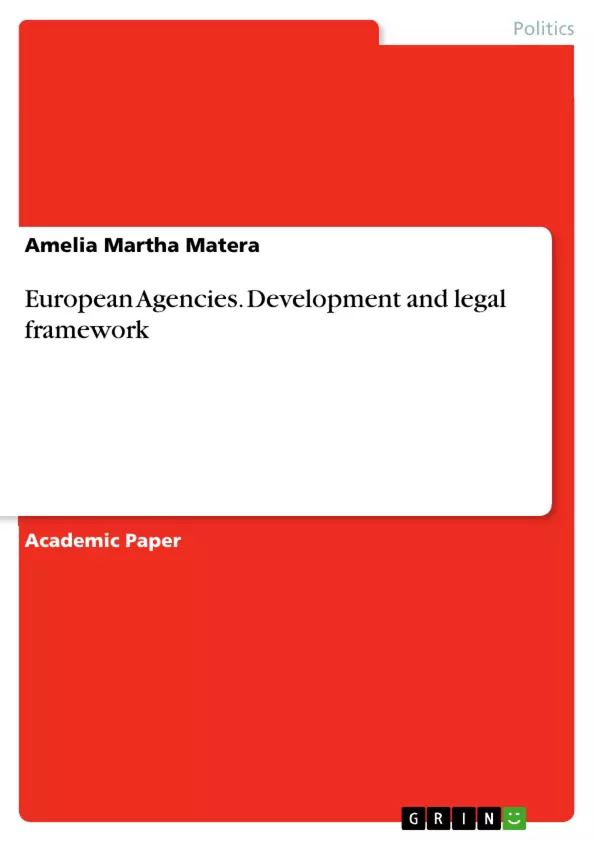Aim of this paper is to understand the role and types of these European Agencies (EAs) and the main problems connected to them. First, we will try to find a definition of Agencies. Starting from the first agencies we will analyse how these developed in their number, structure, role and competencies.
After this, it is important to understand the legal framework in which EAs are established, and to analyse if the agencies are attracted by the community method or not. At this point, we will find several critics, the main rising question concerns the delegation of power, how much competencies can the European Commission delegate to Agencies? Why should the EU delegate power? In order to have basic knowledge to discuss this topic we have to mention the Meroni law-case.
In the academic literature, the EAs are often considered as the fourth branch of governments. What does this mean? After an overview about basics elements of EAs and a discussion about the main problems involved, we will come to our conclusion.
Inhaltsverzeichnis (Table of Contents)
- Introduction
- Evolution of European Agencies
- Types of European Agencies
- Legal Framework and Community method
- Delegated power and the Meroni law-case
- EU Agencies: Fourth Branch?
- Conclusion
Zielsetzung und Themenschwerpunkte (Objectives and Key Themes)
This paper aims to comprehensively examine the role, types, and challenges associated with European Agencies (EAs). It explores the evolution of these agencies, their legal framework, and the ongoing debate concerning the delegation of power from the European Commission to EAs. The paper analyzes the different types of agencies and their respective functions, drawing parallels with American administrative structures.
- Evolution and Growth of European Agencies
- Legal Framework and Delegation of Power
- Types and Functions of European Agencies
- The "Fourth Branch" Argument
- The Community Method and its Application
Zusammenfassung der Kapitel (Chapter Summaries)
- Introduction: This chapter provides an overview of European Agencies and their significance in the context of the European Union (EU), outlining the paper's objectives and key themes.
- Evolution of European Agencies: This section delves into the historical development of European Agencies, highlighting their increasing number, changing roles, and expansion of competencies. The chapter explores the differences between European and American administrative structures, particularly concerning the delegation of power. It also examines the motivations behind the creation of agencies and their potential benefits and drawbacks.
- Types of European Agencies: This chapter focuses on classifying European Agencies into different categories based on their functions and areas of expertise. It discusses information agencies, regulatory agencies, and executive agencies, highlighting their distinct characteristics and roles. The chapter analyzes the evolution of agency types and their impact on EU governance.
- Legal Framework and Community method: This chapter investigates the legal framework governing the establishment and operation of European Agencies. It explores the application of the Community method to agency activities and examines the implications of delegated power. The chapter delves into the ongoing debate regarding the balance of power between the European Commission and agencies.
- Delegated power and the Meroni law-case: This chapter examines the issue of delegated power and the Meroni law-case, a pivotal case in the legal history of European Agencies. It analyzes the legal arguments and implications of the case, highlighting the challenges and complexities of delegating power to agencies. The chapter emphasizes the importance of transparency and accountability in the decision-making processes of agencies.
- EU Agencies: Fourth Branch?: This chapter explores the concept of European Agencies as a "fourth branch" of government. It examines the arguments supporting and opposing this notion, considering the implications for the separation of powers and the democratic accountability of agencies. The chapter analyzes the potential impact of agencies on EU decision-making and the balance of power within the Union.
Schlüsselwörter (Keywords)
European Agencies, EU Governance, Delegation of Power, Community Method, Administrative Structures, Regulatory Agencies, Executive Agencies, Information Agencies, Fourth Branch, Meroni Law-Case.
Frequently Asked Questions
What are European Agencies (EAs)?
European Agencies are specialized bodies established to provide expertise and support to EU institutions and member states in specific technical or scientific areas.
What is the "Meroni law-case" and why is it important?
The Meroni case is a pivotal legal precedent that limits the extent to which EU institutions can delegate discretionary powers to external agencies.
Why are EAs sometimes called the "fourth branch of government"?
This term refers to the fact that agencies often operate with a degree of independence from traditional legislative, executive, and judicial branches, similar to administrative agencies in the US.
What are the different types of European Agencies?
They can be classified into information agencies (collecting data), regulatory agencies (implementing rules), and executive agencies (managing specific programs).
How do EAs relate to the "Community method"?
The paper analyzes whether agencies follow the traditional Community method of EU decision-making or if they represent a shift toward new forms of governance.
- Citation du texte
- Amelia Martha Matera (Auteur), 2018, European Agencies. Development and legal framework, Munich, GRIN Verlag, https://www.grin.com/document/416259



